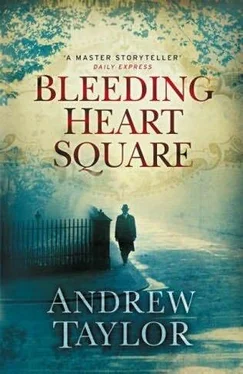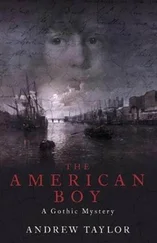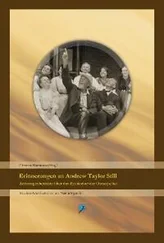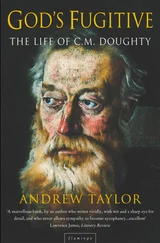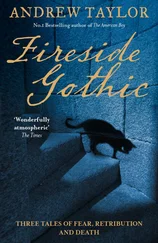Andrew Taylor - Bleeding Heart Square
Здесь есть возможность читать онлайн «Andrew Taylor - Bleeding Heart Square» весь текст электронной книги совершенно бесплатно (целиком полную версию без сокращений). В некоторых случаях можно слушать аудио, скачать через торрент в формате fb2 и присутствует краткое содержание. Жанр: Триллер, на английском языке. Описание произведения, (предисловие) а так же отзывы посетителей доступны на портале библиотеки ЛибКат.
- Название:Bleeding Heart Square
- Автор:
- Жанр:
- Год:неизвестен
- ISBN:нет данных
- Рейтинг книги:5 / 5. Голосов: 1
-
Избранное:Добавить в избранное
- Отзывы:
-
Ваша оценка:
- 100
- 1
- 2
- 3
- 4
- 5
Bleeding Heart Square: краткое содержание, описание и аннотация
Предлагаем к чтению аннотацию, описание, краткое содержание или предисловие (зависит от того, что написал сам автор книги «Bleeding Heart Square»). Если вы не нашли необходимую информацию о книге — напишите в комментариях, мы постараемся отыскать её.
Bleeding Heart Square — читать онлайн бесплатно полную книгу (весь текст) целиком
Ниже представлен текст книги, разбитый по страницам. Система сохранения места последней прочитанной страницы, позволяет с удобством читать онлайн бесплатно книгу «Bleeding Heart Square», без необходимости каждый раз заново искать на чём Вы остановились. Поставьте закладку, и сможете в любой момент перейти на страницу, на которой закончили чтение.
Интервал:
Закладка:
‘Thanks. Whisky, please.’
Fenella appeared in a doorway at the end of the hallway. She was wearing a long apron stained with what looked like blood. ‘Rory, how lovely.’ She held up her cheek to be kissed. ‘I opened a tin of soup and it sort of exploded. Give him a drink, Julian, while I lay the table.’
They were acting just like a bloody married couple already, Rory thought savagely, as he followed Julian Dawlish into a sparsely furnished sitting room at the front of the house. Dawlish splashed whisky into another glass and handed it to Rory.
‘I know what you’re thinking,’ he said. ‘What a hole. Help yourself to soda.’
‘Not at all,’ Rory said stiffly. He squirted soda into his glass. ‘Cheers.’
‘Cheerio.’ After they had drunk, Dawlish went on, ‘It will look very different once it’s properly decorated and the curtains are up. Fenella is going to move some of her own stuff in. It will be very snug, I think.’ He snapped open his cigarette case and held it out. ‘Smoke?’
They lit cigarettes and sat down opposite each other on hard chairs. They both drank more whisky. Rory was nervous and he drank faster than usual. Before he knew what was happening, Dawlish had topped up his glass again.
‘How’s the job-hunting going?’ Dawlish asked.
‘So-so,’ he said, feeling a warm glow suffusing itself through his stomach.
‘Do you do any freelancing?’
‘I’ve not had much time to look into that. One needs the contacts, you see. And having been in India …’
‘Yes, of course. And it’s damned hard these days, I imagine, finding the openings. But would you be interested, in principle?’
The second whisky was rapidly joining the first. ‘I’d go for it like a shot.’
‘Because I might be able to put you on to something. If you’re interested, that is.’ Dawlish smiled apologetically — he had to a fine art that knack of making it seem that you were doing him a favour by allowing him to do you a favour. ‘Pal of mine edits a magazine. A weekly. I know he’s always looking for good stuff. Every time I see him he goes on about how hard it is to find reliable contributors.’
‘What’s it called?’
‘ Berkeley’s .’
‘I know.’ Of course he knew of Berkeley’s , a magazine that specialized in political analysis and cultural reviews. Lord Byron had probably read it. So had Gladstone. So did everyone who was anyone except for dyed-in-the-wool Tories, whose reading was confined to the Morning Post .
‘Interested?’ Dawlish said.
‘Very much so. But I’m not sure what I can offer.’
‘Ah,’ Dawlish said. ‘I think you underestimate yourself. Look, it’s easier if I put my cards on the table. This could do you a good turn, but it could do me a good turn too.’
‘I don’t follow.’
‘I know the editor is interested in how the Fascists work in this country. Their recruiting, their propaganda and so on. As you know the magazine, you’ll appreciate they’re — well, let’s say sceptical about Fascism and all its works. There’s the meeting coming up in Rosington Place at the end of the week. Now that’s interesting, because it shows that Mosley is trying to target the business community in particular. He’s not a fool — he realizes he’s not going to get anywhere without financial backers, without substantial support from the City — not just the big guns but the little fellows too. And a lot of his sponsors were put off by the violence in Earls Court in June. The iron fist was a little too obvious, if you follow me. So if you were to write a piece of say a thousand or fifteen hundred words about the meeting, showing how they’re trying to recruit support, I think that could be interesting. And if there’s anything I can do to help, just ask.’
He leant forward with the whisky bottle. Rory held out his glass.
‘You’re assuming I would take a critical slant?’
Dawlish smiled. ‘I’m assuming you’d report what you saw and heard in an accurate and interesting way. Fenella showed me some of your cuttings. She’s got a scrapbook, you know.’
Rory tried to remember what he had sent her. There must have been the usual drivel he wrote for the South Madras Times — pieces on receptions and cricket matches, court cases and anecdotes. Samples of the jobbing work of a provincial journalist.
‘What particularly interested me were the ones on the Congress Party. There was one on the consequences of the Gandhi-Irwin Pact, I remember, and another on Gandhi’s work with the untouchables. It’s a shame there weren’t more like that.’
‘They didn’t go down well with all our readers,’ Rory said. ‘Nor with the editor. I only got some of the pieces through because he was on leave. But they weren’t political in stance. I was only reporting what was actually happening.’
‘I don’t think Berkeley’s would mind that sort of reporting. In fact I think they’d rather like it. It’s a fresh eye, the outsider’s perspective. Have you got a typewriter, by the way?’
‘Yes, of course.’
There were footsteps outside. ‘Lunch is served,’ Fenella said. ‘Bring your glasses.’
Fear smothered her like black treacle, making it hard to breathe and impossible to think. She tried the door again. It wouldn’t move. She ran to the window and peered through a gap between the planks. All she could see were dying nettles and a stretch of ragged hedgerow. She opened her mouth to call for help and then closed it.
There were two possibilities: either a sudden gust of wind had improbably blown the door shut and somehow wedged it, or somebody had closed it deliberately with the intention of making her a prisoner. If she called out, the only person likely to hear would be her captor — assuming there was a captor.
Lydia had been standing with her back to the doorway looking at the cigar box. Nobody could have closed the door without seeing her inside. Why shut her in? She tried to think it through but there was not an obvious answer.
Sooner or later, she told herself firmly, she would be missed. She had been seen in the village. She had little doubt that Mrs Alforde would organize a search party, and little doubt that Mrs Alforde would find her. It was tiresome — not least because it was growing colder — but surely nothing to worry about.
In the depths of her mind, however, more malign possibilities were stirring. A mother and baby had died in this nasty little barn. It was a place that aroused strong emotions. As the minutes passed, she found it harder and harder to be entirely rational. The light was fading, and she thought she heard rustlings in the straw and saw minute movements on the very edge of her range of vision.
And were there rats too?
‘Help! Is there anyone there? Help!’ She waited by the window, and then tried again, crying out the same words that were flat and useless because there was nobody to hear them.
Lydia’s throat was growing sore. There were half a dozen smoke-blackened bricks in one corner of the barn, perhaps a makeshift hearth for a tramp or even Amy Narton. She lifted one of them. Holding it in both hands, she banged it against the planks of the door. And again, and again, and again. The door didn’t budge and showed only the smallest indentations under the rain of blows.
The rough surface of the brick was chafing her hands. She put on her gloves again and kept hammering as rapidly as she could. The brick grew heavier, her arms more tired and her hands more painful. Each time she hit the wood, she gasped; and she had the strange, uncomfortable thought that Amy Narton must have made similar rhythmic sounds in the last desperate hours of her short life.
Finally, her strength gave out. She took a step back and dropped the brick, which fell with a dull thud to the earth floor. Her arms were trembling. The blood pounded in her veins and her throat was dry. She was slightly deaf. The brick had ruined the gloves, in places cutting through the kid leather and digging into her skin beneath. She held up her hands to the light from the window. There were smears of grime and blood on the pale leather. At least she was warmer. She would rest her arms for five minutes, she decided, and then try again.
Читать дальшеИнтервал:
Закладка:
Похожие книги на «Bleeding Heart Square»
Представляем Вашему вниманию похожие книги на «Bleeding Heart Square» списком для выбора. Мы отобрали схожую по названию и смыслу литературу в надежде предоставить читателям больше вариантов отыскать новые, интересные, ещё непрочитанные произведения.
Обсуждение, отзывы о книге «Bleeding Heart Square» и просто собственные мнения читателей. Оставьте ваши комментарии, напишите, что Вы думаете о произведении, его смысле или главных героях. Укажите что конкретно понравилось, а что нет, и почему Вы так считаете.
